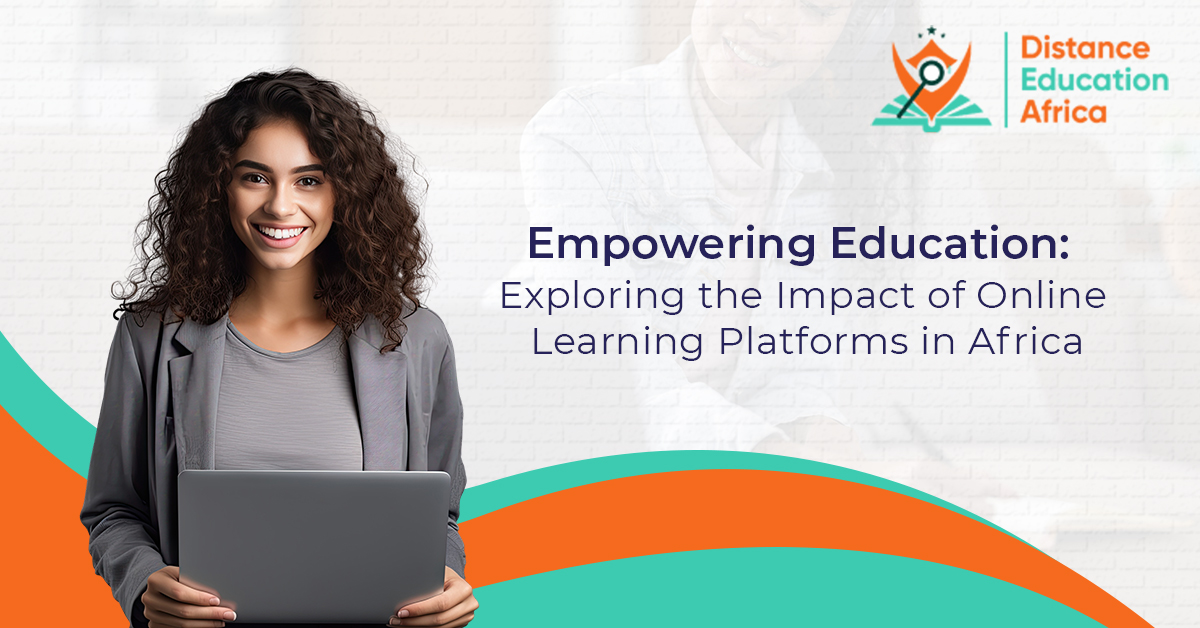Blog Summary
The Transformative Role of Online Learning Platforms in Africa” explores how online learning platforms reshape education. They bridge gaps by providing access to quality education, fostering lifelong learning, democratizing higher education, and encouraging collaboration. By breaking down barriers, these platforms empower individuals to pursue their educational aspirations, irrespective of their background or circumstances. As hubs of innovation and collaboration, they facilitate critical thinking and problem-solving skills, preparing learners to tackle real-world challenges. Embracing technology ensures inclusive and equitable access to education, shaping a brighter future for Africa.
Introduction
In recent years, online learning platforms have emerged as powerful tools for democratizing education and expanding access to learning opportunities across Africa. These platforms offer various courses, from academic subjects to vocational skills, accessible to learners of all ages and backgrounds. This article will delve into the revolutionary influence of online learning platforms in Africa, examining how they are revolutionizing education and empowering individuals to pursue their educational goals.
Section 1: Bridging the Education Gap
Online learning platforms have emerged as indispensable tools in narrowing the education gap across Africa, especially in regions where traditional educational resources are scarce. By providing access to a wealth of high-quality educational content, ranging from lectures to interactive materials, these platforms empower learners in remote areas to pursue education without the constraints of physical classrooms. This accessibility revolutionizes the learning landscape by extending educational opportunities to individuals who otherwise face insurmountable geographic or socioeconomic barriers to formal education.
Furthermore, the impact of online learning platforms goes beyond merely providing access to educational resources; it fosters a sense of inclusivity and empowerment among learners. By breaking down geographic and socioeconomic barriers, these platforms create a level playing field where all individuals can access the same educational content and opportunities regardless of their background. This democratization of education ensures that talent and potential are no longer restricted by factors such as location or economic status but rather by determination and dedication to learning. Thus, online learning platforms catalyse social mobility and economic empowerment, enabling individuals to transcend limitations and unlock their full potential.
Section 2: Fostering Lifelong Online Learning
Online learning platforms catalyse a culture of lifelong learning, offering individuals unparalleled flexibility and autonomy in their educational pursuits. Unlike traditional education systems characterized by rigidity and time constraints, online learning empowers individuals to learn at their own pace and schedule. This flexibility encourages continuous skill development and personal growth, enabling learners to adapt to the dynamic demands of the modern workforce.
By embracing online learning, individuals are equipped with the tools and resources to seek lifelong learning journeys tailored to their unique interests and career aspirations. Whether acquiring new skills or delving into specialized subjects, the accessibility and flexibility of online learning platforms empower individuals to unlock their full potential and thrive in an ever-changing world.
Section 3: Democratizing Access to Higher Education
The advent of online learning platforms has heralded a new era of accessibility to higher education in Africa, effectively dismantling barriers that once hindered aspiring learners. Through the proliferation of online degree programs, individuals now have unparalleled access to accredited qualifications and credentials from prestigious universities worldwide, all without the logistical hurdles of relocation or the burden of exorbitant tuition fees.
This transformative shift has democratized the pursuit of higher education, offering a level playing field where aspiring students and professionals alike can advance their academic and career aspirations regardless of geographical constraints or financial limitations. By transcending traditional boundaries, online learning platforms have empowered learners to chart their educational journeys on their terms, fostering a culture of inclusivity and opportunity that extends far beyond the confines of traditional academic institutions.
Section 4: Fostering Innovation and Collaboration
Online learning platforms have evolved into vibrant hubs of innovation and collaboration, serving as virtual meeting grounds for learners, educators, and experts from diverse backgrounds and perspectives. Through the myriad virtual forums, discussion groups, and collaborative projects facilitated by these platforms, learners are empowered to engage with their peers and mentors actively. They can freely exchange ideas, seek guidance, and collaborate on projects, breaking down the constraints of geographic boundaries.
This collaborative learning environment encourages creativity and cultivates critical thinking and problem-solving skills among participants. By immersing themselves in such interactive experiences, learners are better equipped to confront real-world challenges and make significant contributions to their communities and industries. Thus, online learning platforms catalyse innovation, collaboration, and collective growth, enabling learners to unleash their full potential and drive positive societal change.
Conclusion:
In conclusion, online learning platforms transform education in Africa, empowering individuals to pursue their educational aspirations and unlock their full potential. By bridging the education gap, fostering lifelong learning, democratizing access to higher education, and promoting innovation and collaboration, these platforms drive positive change and pave the way for a brighter future for education in Africa. As we continue to harness the power of technology to expand access to education, we must ensure that online learning remains inclusive, accessible, and equitable for all learners, regardless of their background or circumstances. We can build a more educated, empowered, and prosperous Africa for future generations.


